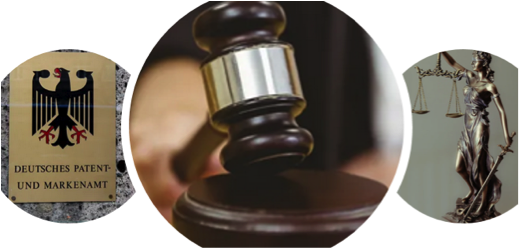German Patent Act Updates and the Role of DIN77006
With the passing of the law for the modernization of patent law in the German Bundestag early this morning, the regulations of patent law will be adapted to the challenges of the time and in particular the requirements of digitalization for the first time in more than 10 years.
The key point of this change in the law will be that the courts will have more leeway to counteract the abuse of patent law, but also to be able to make more balanced decisions. Until now, the courts had to give a patent holder extensive legal protection, especially omission and compensation, even if he only wanted to disturb an unlawful user with his property right. This was the case even if the patent owner abused the property right. With the change in the law, the courts will have further discretion to react appropriately in patent infringement cases and to decide between granting an injunction or excluding it due to excessive hardship.
In this way, the courts will be able to better reflect the customs of normal business life with their decisions. Such a reform was long overdue, as cases of overly tough decisions due to the activities of patent trolls to the detriment of companies and their business operations have increased in recent years.
But what do the courts base their decision on when assessing custom or good practice in IP management? Until recently, it was a hardly answerable question, which was shaped only by the legal presentation of the parties and less by the relevant circumstances of the IP management. That has recently changed, because since June 2020, with the publication of “DIN 77006: 2020-06 Intellectual Property Management Systems – Requirements”, there has been a tried and tested instrument for bringing life to the term good practice. It is a set of standards that supplements the content of DIN ISO 9001: 2015-11 for the area of quality in IP management. A basis was thus created with which one enables the assessment of the handling of IP in a company, thus creating a “golden standard for IP management”.
It is thus possible for judges to use DIN 77006 as a standard of good practice in IP management to properly assess the individual case for decisions in the event of infringement within the scope of their discretion. Dr. Lorenz Kaiser, General Secretary QIMIP, Quality initiative for the management of intellectual property (IP)
Affected companies who have implemented and verified the requirements of DIN 77006 in their companies can show that they have done everything to avoid an infringement of property rights by taking recognized and dutiful measures into account. If it did happen anyway, it can be no or very little to blame. This should be of inestimable value for the assessment of such cases and offer users of the standardized procedures a considerable advantage.
With the standard, the courts have a transparent set of guidelines for legitimate IP management and can use it to filter out actual cases of gross violations. By applying the standard in their company, companies can make a valuable preventative contribution to avoiding damage. In order to support medium-sized businesses in particular in dealing with DIN 77006, QIMIP, as an independent department of the German Institute for Invention (DIE), has made it its task to be available for questions about the standard or its implementation in the company.
 Dr. Hanns-Peter Tümmler, Chairman of the Board QIMIP®, Quality initiative for the management of intellectual property (IP)
Dr. Hanns-Peter Tümmler, Chairman of the Board QIMIP®, Quality initiative for the management of intellectual property (IP)
Dr. Hanns-Peter Tümmler was born in 1954 and received his doctorate in physics in 1986 at the Central Institute for Biomedical Technology at the Friedrich Alexander University in Erlangen with a focus on implant surfaces. In 1986 he moved to Aesculap AG in Tuttlingen, which is now a division of B. Braun Melsungen AG. There he worked in a wide variety of positions and areas of responsibility. He developed orthopedic implants and supervised medical-scientific projects. In 1991 he took over responsibility for the department “Computer-aided applications and documentation in the context of application development.” In 1993 he was appointed head of the Regulatory Affairs department for ‘Implants and Instruments’ worldwide. From 2000 to 2005 he took over the establishment and management of a newly created development department on the subject of “Navigation in Orthopedics”. From 2005, until he left the company, he was responsible for designing the patent department and leading it from a classic patent administration to a process-oriented IP management system. He ended his active time at B. Braun Aesculap as Senior Patent Counsel in 2017.
 Dr. Lorenz Kaiser, General Secretary QIMIP ®, Quality initiative for the management of intellectual property (IP)
Dr. Lorenz Kaiser, General Secretary QIMIP ®, Quality initiative for the management of intellectual property (IP)
Dr. Lorenz Kaiser is a lawyer specializing in research and development contracts and intellectual property management (IPR). Until February 2018 he worked for the Fraunhofer Society for the Promotion of Applied Research for 34 years, most recently as Director for “R&D Contracts and IPR”. Dr. Kaiser has extensive and practice-based experience in the design and negotiation of complex R&D collaborations, as well as strategic alliances between science and business at home and abroad. His area of work particularly includes legal issues of industrial property protection, such as inventor law, patent law, copyright law, etc. In addition to his legal advisory work, Dr. Kaiser regularly organizes advanced training events in his specialist areas. He participates in national and European expert committees through R&D cooperation and IP management. Since December 2017 he has been Secretary General of the Quality Initiative for IP Management (QIMIP), a department of the German Institute for Inventions (DIE e.V.).



